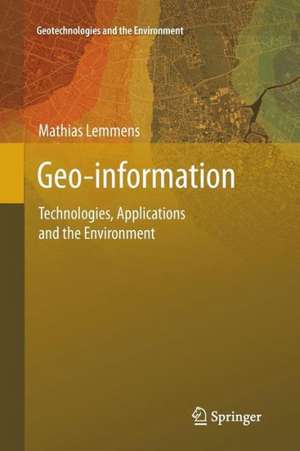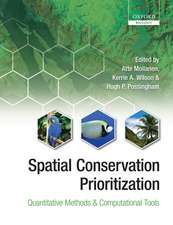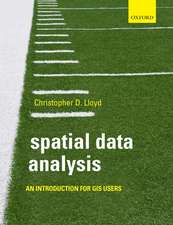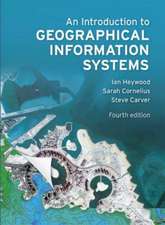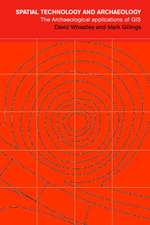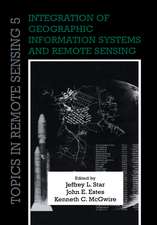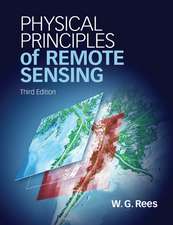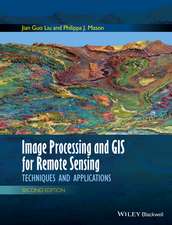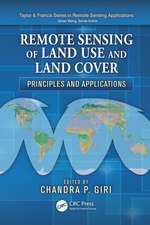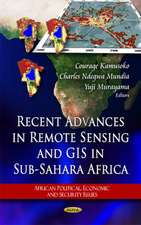Geo-information: Technologies, Applications and the Environment: Geotechnologies and the Environment, cartea 5
Autor Mathias Lemmensen Limba Engleză Paperback – 11 noi 2013
This rapidly developing field uses increasingly complex and accurate systems. Today, technology enables us to capture geo-data in full 3D as well as to disseminate it via the Web at the speed of light. We are able to continuously image the world from space at resolutions of up to 50 cm. Airborne LiDAR (laser surveying) sensors can be combined with digital camera technology to produce geometrically correct images of the Earth's surface, while integrating these with large-scale topographic maps and terrestrial as well as aerial images to produce 3D cityscapes that computer users can explore from their desktops.
| Toate formatele și edițiile | Preț | Express |
|---|---|---|
| Paperback (1) | 1215.04 lei 6-8 săpt. | |
| SPRINGER NETHERLANDS – 11 noi 2013 | 1215.04 lei 6-8 săpt. | |
| Hardback (1) | 1226.42 lei 6-8 săpt. | |
| SPRINGER NETHERLANDS – 3 aug 2011 | 1226.42 lei 6-8 săpt. |
Din seria Geotechnologies and the Environment
- 15%
 Preț: 649.71 lei
Preț: 649.71 lei - 18%
 Preț: 1408.89 lei
Preț: 1408.89 lei - 18%
 Preț: 1007.49 lei
Preț: 1007.49 lei - 18%
 Preț: 945.79 lei
Preț: 945.79 lei - 20%
 Preț: 566.51 lei
Preț: 566.51 lei - 18%
 Preț: 952.09 lei
Preț: 952.09 lei - 18%
 Preț: 948.92 lei
Preț: 948.92 lei - 15%
 Preț: 652.31 lei
Preț: 652.31 lei - 18%
 Preț: 951.77 lei
Preț: 951.77 lei - 15%
 Preț: 639.25 lei
Preț: 639.25 lei - 15%
 Preț: 652.17 lei
Preț: 652.17 lei - 24%
 Preț: 746.98 lei
Preț: 746.98 lei - 24%
 Preț: 778.71 lei
Preț: 778.71 lei - 18%
 Preț: 952.72 lei
Preț: 952.72 lei - 18%
 Preț: 968.34 lei
Preț: 968.34 lei - 24%
 Preț: 790.73 lei
Preț: 790.73 lei - 18%
 Preț: 995.63 lei
Preț: 995.63 lei - 18%
 Preț: 886.92 lei
Preț: 886.92 lei - 5%
 Preț: 1106.69 lei
Preț: 1106.69 lei - 15%
 Preț: 636.12 lei
Preț: 636.12 lei - 18%
 Preț: 967.08 lei
Preț: 967.08 lei - 15%
 Preț: 530.42 lei
Preț: 530.42 lei
Preț: 1215.04 lei
Preț vechi: 1481.76 lei
-18% Nou
Puncte Express: 1823
Preț estimativ în valută:
232.53€ • 241.87$ • 191.96£
232.53€ • 241.87$ • 191.96£
Carte tipărită la comandă
Livrare economică 15-29 aprilie
Preluare comenzi: 021 569.72.76
Specificații
ISBN-13: 9789400737815
ISBN-10: 9400737815
Pagini: 372
Ilustrații: XXII, 350 p.
Dimensiuni: 155 x 235 x 20 mm
Greutate: 0.52 kg
Ediția:2011
Editura: SPRINGER NETHERLANDS
Colecția Springer
Seria Geotechnologies and the Environment
Locul publicării:Dordrecht, Netherlands
ISBN-10: 9400737815
Pagini: 372
Ilustrații: XXII, 350 p.
Dimensiuni: 155 x 235 x 20 mm
Greutate: 0.52 kg
Ediția:2011
Editura: SPRINGER NETHERLANDS
Colecția Springer
Seria Geotechnologies and the Environment
Locul publicării:Dordrecht, Netherlands
Public țintă
Professional/practitionerCuprins
Preface.- 1. Geo-information Technology – What It Is, How It Was and Where It Is Heading.- 2. Earth Viewers.- 3. Understanding Earth-related Phenomena through Maps.- 4. Global Navigation Satellite Systems and Inertial Navigation.- 5. Mobile GIS and Location-based Services.- 6. Terrestrial Laser Scanning.- 7. Photogrammetry: Geometric Data from Imagery.- 8. Airborne Lidar.- 9. Earth Observation from Space.- 10. Modelling and Exchanging Geo-information.- 11. Quality of Geo-information.- 12. Applying Geo-information Technology.- 13. Census Taking.- 14. Risk and Disaster Management.- 15. Land Administration.- Index.
Recenzii
From the reviews:
“This book provides a broad survey of the basics and applications of geoinformation, a topic with long history and great vitality of late. … The volume has a wide potential audience. It could serve as the basis for an undergraduate course in geoinformation or as a resource for graduate students and faculty wishing to develop more background in this area. It is also useful for laypersons interested in geospatial technologies and practitioners. Summing Up: Recommended. Academic, general, and professional audiences, all levels.” (R. A. Kolvoord, Choice, Vol. 49 (6), February, 2012)
“This book provides a broad survey of the basics and applications of geoinformation, a topic with long history and great vitality of late. … The volume has a wide potential audience. It could serve as the basis for an undergraduate course in geoinformation or as a resource for graduate students and faculty wishing to develop more background in this area. It is also useful for laypersons interested in geospatial technologies and practitioners. Summing Up: Recommended. Academic, general, and professional audiences, all levels.” (R. A. Kolvoord, Choice, Vol. 49 (6), February, 2012)
Textul de pe ultima copertă
Geomatics, the handling and processing of information and data about the Earth, is one geoscience discipline that has seen major changes in the last decade, as mapping and observation systems become ever more sensitive and sophisticated. This book is a unique and in-depth survey of the field, which has a central role to play in tackling a host of environmental issues faced by society. Covering all three strands of geomatics - applications, information technology and surveying - the chapters cover the history and background of the subject, the technology employed both to collect and disseminate data, and the varied applications to which geomatics can be put, including urban planning, assessment of biodiversity, disaster management and land administration. Relevant professionals, as well as students in a variety of disciplines such as geography and surveying, will find this book required reading.
This rapidly developing field uses increasingly complex and accurate systems. Today, technology enables us to capture geo-data in full 3D as well as to disseminate it via the Web at the speed of light. We are able to continuously image the world from space at resolutions of up to 50 cm. Airborne LiDAR (laser surveying) sensors can be combined with digital camera technology to produce geometrically correct images of the Earth's surface, while integrating these with large-scale topographic maps and terrestrial as well as aerial images to produce 3D cityscapes that computer users can explore from their desktops.
The author of this book, Mathias J.P.M. Lemmens, has thirty years of research and teaching experience in the field of geodesy, photogrammetry, remote sensing, Lidar technology and land surveying gained at Delft University of Technology, the Netherlands, and other institutions. He operates as an international consultant focused on emerging and developing countries. As Editor of the worldwide geomatics magazine GIMInternational since 1998 he brings numerous state-of-the art technologies and applications to a broad audience of professionals through highly valued feature articles, product surveys, interviews and columns.
This rapidly developing field uses increasingly complex and accurate systems. Today, technology enables us to capture geo-data in full 3D as well as to disseminate it via the Web at the speed of light. We are able to continuously image the world from space at resolutions of up to 50 cm. Airborne LiDAR (laser surveying) sensors can be combined with digital camera technology to produce geometrically correct images of the Earth's surface, while integrating these with large-scale topographic maps and terrestrial as well as aerial images to produce 3D cityscapes that computer users can explore from their desktops.
The author of this book, Mathias J.P.M. Lemmens, has thirty years of research and teaching experience in the field of geodesy, photogrammetry, remote sensing, Lidar technology and land surveying gained at Delft University of Technology, the Netherlands, and other institutions. He operates as an international consultant focused on emerging and developing countries. As Editor of the worldwide geomatics magazine GIMInternational since 1998 he brings numerous state-of-the art technologies and applications to a broad audience of professionals through highly valued feature articles, product surveys, interviews and columns.
Caracteristici
Comprehensive overview of the entire geomatics discipline, suited not only for professionals but also for knowledgeable individuals The theory is supported by a lot of facts, examples, vision and opinions Discussion of societal consequences of using geo-informatics technology in developing countries
